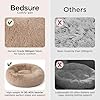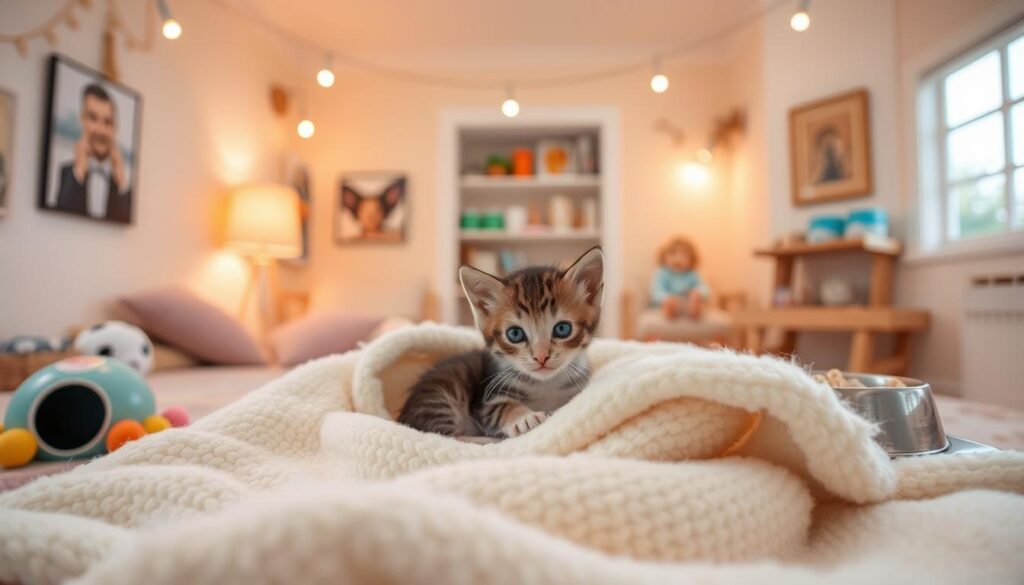Ever thought about how much a 2 week old kitten depends on its mom? What if they’re left alone? Knowing how to care for a newborn kitten is key for their health. At two weeks, kittens hit big milestones and need the right food to grow.
This guide will cover kitten feeding, growth stages, and care tips. These will help your little friend grow strong and healthy.
Key Takeaways
- Kittens should be fed every two to four hours if motherless, using a kitten-safe formula.
- Maintaining a warm environment with temperatures around 90°F is crucial for 2 week old kittens.
- Vet consultation is advised if a kitten’s eyes don’t open by day 10 to ensure proper development.
- Introducing deworming regimens around the second week is essential for their health.
- Socialization starts around four weeks old, with gentle handling recommended as they grow.
Understanding the Developmental Milestones of a 2 Week Kitten
At two weeks old, kittens hit key kitten developmental milestones. They start to grow more independent. At this age, they weigh between 8.8 and 12.3 ounces (250 to 350 grams), having doubled their birth weight.
Kittens show big physical changes during this time. Their eyes start to open, sometimes showing bright blue colors. But their vision is still poor. Their ear canals also open fully, helping them sense their surroundings better.
Even with these advances, kittens move clumsily. They mostly explore by smell. This is because their movements are still not very coordinated.
A 2 week old kitten eats every three to four hours. They still need their mother or a surrogate for food. This food is key for their growth. Kittens at this age also look for warmth and care, showing they are still very dependent.
Veken Innovation Award Winner Stainless Steel Cat Water Fountain, 95oz/2.8L Automatic Pet Fountain Dog Water Dispenser with Replacement Filters & Silicone Mat, Gifts for Cats, Dogs (Silver)
Kasa Smart Indoor Pan-Tilt Home Security Camera, 1080p HD Dog Camera w/Night Vision, Motion Detection for Baby & Pet Monitor, Cloud & SD Card Storage, Works w/ Alexa & Google Home, 2.4G WiFi (EC71)
Bedsure Calming Dog Bed Medium Size Dog – Donut Washable Medium Pet Bed, 30 inches Anti-Slip Round Fluffy Plush Faux Fur Cat Bed, Fits up to 45 lbs Pets, Camel
Bedsure Cute Cat Couch for Pets – Fluffy Cat beds with Premium Soft Corduroy Fleece, Fuzzy Cats beds for Indoor Cats with Removable Washable Cover, Supportive Pet Sofa, 24inch, Cream
Dr. Elsey’s Ultra Unscented Clumping Clay Cat Litter 18 lb Bag
Voyager Step-in Pet Harness – All Weather Mesh, Adjustable Step in Harness for Cats and Dogs by Best Pet Supplies – Pink, S
Purina Friskies Pate Wet Cat Food Variety Pack Seafood and Chicken Pate Favorites 40ct VP – (Pack of 40) 5.5 oz. Cans
48% OffYaheetech 54in Cat Tree, Multi-Level Cat Tower with Spacious Kitten-ear Perch, 2 Cozy Caves, Scratching Posts, Climbing Ladder, 2 Plush Balls, Durable Pet House Furniture for Indoor Kittens, Dark Gray
15% OffBedsure Waterproof Dog Blankets for Small Dogs – Small Cat Blanket Washable for Couch Protection, Sherpa Fleece Puppy Blanket, Soft Plush Reversible Throw Furniture Protector, 25″X35″, Grey
Purina Friskies Dry Cat Food Seafood Sensations With Salmon, Tuna, and Shrimp Flavors – 22 lb. Bag
Physical Characteristics of a 2 Week Kitten
A 2 week old kitten grows fast and changes a lot. Knowing about its size, weight, and senses helps us see how it’s doing. These things tell us a lot about its health and growth.
Weight and Size
At two weeks, kittens usually weigh between 8.8 to 12.3 ounces (about 250 to 350 grams). They grow quickly, doubling their weight from last week. It’s important to check their weight often because healthy kittens should keep gaining.
Here’s a table showing average kitten weights in the first few weeks:
| Age (Weeks) | Weight Range (Ounces) |
|---|---|
| 1 | 5.3 to 8.8 |
| 2 | 8.8 to 12.3 |
| 3 | 12.3 to 15.9 |
| 4 | 15.9 to 19.2 |
Eye and Ear Development
By two weeks, kittens make big strides in their senses. Their 2 week kitten eye development shows their eyes are open and blue, but they can’t focus well yet. Their kitten ear development is also impressive. Their ears are small and round, and they start to hear sounds better.
Feeding Guidelines for a 2 Week Kitten
Knowing what to feed a 2 week old kitten is key for their health. At this age, kittens need milk for nutrition. It’s vital to use kitten formula, not cow’s milk, to avoid digestive issues. A good feeding schedule is crucial for their growth.
What to Feed a 2 Week Old Kitten
For the best nutrition, use high-quality kitten formula. Kittens need about 1/2 tablespoon of formula every 2 to 3 hours. This helps them meet their high energy needs.
A 2-week-old kitten weighing about 9 ounces needs about 69 ml of formula daily. This is spread over 7 small feedings.
Temptations Classic Crunchy and Soft Cat Treats Tasty Chicken Flavor, 30 oz. Tub
Cat Toy, Cat Scratchers for Indoor Cats Magic Organ Foldable Cardboard Cat Scratcher Kitten Toy Interactive Relieve Boredom and Exercise Brown-1Pcs
Vivirata Automatic Litter Box for Multiple Cats, Large Capacity Self Cleaning Litter Box with App Control, Odor & Noise Control, Dual Safety Sensors, Easy Maintenance with 2 Roll Garbage Bags, Gray
33% OffCat Scratch Puzzle Enrichment Box, Wooden Cat Nail File Box, Maze Cat Scratch Puzzle Box & Sandpaper Inside, It’s A Stress-Free Alternative to Trimming Your Nails
Fancy Feast Poultry and Beef Feast Classic Pate Collection Grain Free Wet Cat Food Variety Pack – (Pack of 30) 3 oz. Cans
53% OffPetSafe ScoopFree Premium Crystal Cat Litter – Outperforms Clay Litter – Refill Packs – Reusable Tray Compatible – Fresh Scent – 4.3 lb Bags – 2 Pack
Temptations MixUps Catnip Fever Flavor Crunchy and Soft Cat Treats, 16 oz. Tub
Temptations Creamy Puree Variety Pack of Lickable Cat Treats, 0.42 oz. Tubes, 48 Count
Wireless Cat Water Fountain Cordless: Stainless Steel Cat Fountains for Drinking – 88oz/2.6L Battery Operated Pet Water Fountain Indoor with Motion Sensor – Rechargeable Automatic Water Dispenser
Pet Hair Remover for Laundry – Dog & Cat, Upgraded Higher Hair Dissolution, Detergent + Stain Remover, 6-Month Supply, HE/Top/Front-Load Compatible, Removes Residue & Odors, Septic Safe
Feeding Schedule for Kittens
The feeding schedule for 2 week kittens is based on regular intervals. This ensures they get the nutrition they need. Kittens should be fed as follows:
| Age | Weight (oz) | Daily Caloric Requirement (kcal) | Formula Amount per Day (ml) | Feedings per Day |
|---|---|---|---|---|
| 2 weeks | 9 oz | 51 kcal | 69 ml | 7 |
| 4 weeks | 16 oz | 91 kcal | 123 ml | 5 |
As you follow the 2 week kitten feeding schedule, watch for your kitten’s cues. Make sure they are on their stomachs while feeding to avoid choking. This careful feeding helps them grow healthy and strong.
2 Week Kitten Care Essentials
Caring for a 2 week old kitten is all about their environment and hygiene. They need a warm and cozy place to live. This is because they can’t control their body temperature yet.
Maintaining Proper Temperature
The nest should be around 80°F for a 2 week kitten. This keeps them from getting too cold. You can use heating pads or warm towels to keep them warm.
Make sure they can move away if they get too hot. This keeps them safe and comfortable as they grow.
Cleaning and Hygiene
Keeping a 2 week old kitten clean is key to their health. Clean them with a warm, damp cloth after each meal. This helps them learn to use the bathroom.
Also, gently rub their anal area with a warm cotton ball. This helps them go to the bathroom like a mother cat would. Good hygiene early on helps avoid health problems.
Health Benefits of Proper Nutrition for Newborn Kittens
Proper nutrition is key for newborn kittens’ health and growth. In the first three to four weeks, they rely on nursing for energy and nutrients. If they’re orphaned, they need to be bottle-fed every two to four hours with kitten-safe formula. Cow’s milk is harmful to them.
Keeping them warm is crucial. Without a mother, ensure their environment is around 90°F. This helps them stay comfortable.
Checking their weight daily is a good kitten health tip. A healthy kitten’s weight can double or triple in the first weeks. By three weeks, they start to manage their potty needs, showing they’re growing well.
Kitten nutrition has long-term benefits. At four weeks, interacting with humans helps them become more social. Proper nutrition prevents dehydration and malnutrition, boosting their immunity. By then, they should eat quality solid food that meets AAFCO standards.
Offering a mix of wet and dry foods helps with hydration and dental health. Foods like Hill’s Science Diet and Purina Pro Plan are great for their energy needs. Make sure they always have fresh water to stay hydrated.
Following these tips will help kittens grow into healthy adults. Be careful not to underfeed or overfeed them. Start with three meals a day and adjust as they grow.

- 🐱 【Multifunctional Activity Center】The cat Tree provides 3 top perches platforms and two cozy condo. Whether your kitten wants to stretch out on a spacious perch, curl up in a plush hole room, or release the urge to scratch on a sisal pole, this multifunctional cat tree tower works perfectly as a recreation paradise,which can make your fur baby's day full of fun and excitement!two toys gives them a unique way and Fun to play!
- 🐱【 Large Space Vertical】Because of its compact footprint and ability to conserve floor space, the cat tree design offers a large amount of vertical space. Every cat can have their own zone thanks to the cat jumping platform, which is another way that modern cat trees promote indoor cat peace. Maximum Load Capacity: 44 lbs. If your cat is too big for this cat tree, please buy one for tiny and medium-sized cats!
- 🐱 【Stable Construction】Our Cat Tower is made of high-quality particle board with skin friendly plushy faux-fur cover to keep your cat warm and comfortable. The cat activity tree has a wall anchor strap which provides a good double security protection. You don't have to worry that the cat tree will overturn or shake accidentally.Give your cat the best protection!ideal for average kittens and cats.
- 🐱 【Posts for Scratching Covered in Sisal 】These are scratching surfaces that are integrated into the framework. Cats love to bury their claws in sisal because it's a sturdy substance with a coarse texture. Our cat tree promotes healthy scratching habits and helps discourage cats from damaging furniture by offering dedicated spaces for them to scratch.
- 🐱 【Simple assembly】We understand that convenience is important to pet owners, which is why we made our cat tree simple to assemble in a matter of minutes. You can quickly provide your kitties a stimulating environment by following the simple setup instructions and using the available tools. Please feel free to contact us with any questions you may have about our cat tree, and we will respond to you within a day!

- Teething Fun: Ideal for kittens and cats alike, these chew toys are an essential addition to your kitty’s dental care. With natural gall fruit and rope design, the toys are perfect for teething and teeth cleaning, they combat tartar and freshen breath, making dental hygiene a fun activity for your little one!
- Infused with Catnip Aroma: The included catnip bag emits a soothing aroma that's irresistible to felines, ensuring these toys are a calming and engaging presence for indoor play. Our cat toys provide the calming, meow-inducing fun every kitten craves, along with a funny and interactive experience.
- Energetic Exercise: Promote healthy exercise and self-play with our toys' appealing textures and tassels. They’re designed to entice your kitty to bite and play aggressively without harm, offering hours of exercise and self-amusement, keeping your cat active and happy.
- Quiet Play: These soft colorful ropes provide enriching quiet playtime without bothering cat owner's sleep or life. Your kitty will love the funny snake-like shapes, enhancing their playtime with every pounce and bite.
- Safe and Organic: These chew toys, handcrafted without any metal wire and using organic cotton rope, are safe for all cats. Paired with a reusable catnip bag, they’re an essential, eco-friendly addition to your cat’s enrichment collection.

- MADE WITH WHOLESOME INGREDIENTS YOU CAN TRUST: Every Inaba product is made with yummy ingredients including farm-raised chicken and/or wild-caught tuna
- KEEP OUR FELINE HYDRATED WITHOUT ADDING CALORIES: Each delicious, creamy Churu tube contains 91% moisture and only 6 calories (a tenth of the calories of traditional dry cat treats), which makes it a healthy snack you can feel good about feeding
- FREE OF THE BAD STUFF: Your feline friend is important to us, which is why we've kept things like grains, preservatives, artificial colors and carrageenan out of our cat treats, but we added things like Vitamin E for immunity
- HAVE THEM EATING OUT OF YOUR HAND: These lickable purée meat tubes for cats were designed to be fed by hand, as an interactive way to spend time with your feline, but you can use as a wet/dry cat food topper or as a way to disguise medication
- ADD SOME VARIETY TO YOUR CAT'S LIFE: Available in eleven savory flavors, cats of all stages (kitten to senior) will be able to find a flavor they love

- FREEZE-DRIED RAW MINNOWS CAT TREAT: Vital Essentials Freeze Dried Cat Treats pack more protein than industry standard into every bite to deliver the peak vitality your dog deserves. Our natural freeze-dried raw cat treats are made from responsibly sourced premium minnows.
- BETTER PROTEIN = BETTER BENEFITS: The best freeze dried cat treats on the market use premium butcher cut raw protein to unlock the benefits of naturally occurring vitamins and minerals in raw muscle and organs, because pets deserve the energetic playtimes, healthy skin, shiny coats, strong teeth, and essential gut health that a high-protein diet delivers.
- PROUDLY AMERICAN CRAFTED: All our cat treats and food are responsibly sourced and humanely harvested to ensure the quality of our proteins. We go above industry standards to preserve flavor and ensure the highest quality of protein and nutrients in every Vital Essentials product.
- MADE WITHOUT: Cat treat additives, fillers, dyes, flavorings, artificial preservatives, grains, or rendered by-products. Vital Essentials also offers the widest variety of single-protein raw cat food and treats on the market—great for picky eaters and cats with allergies!
- RAW CAT TREATS FREEZE DRIED FOR PEAK FRESHNESS: Our protein is frozen within 45-minutes of harvesting to lock in peak nutrients, flavor, and freshness. A slow-freeze-dry ensures minimal processing, while preserving the vital nutrients that our pets deserve, the way nature intended.

- Cats Lose Their Cool: Just shake the pack, and your favorite feline will come running for their favorite cat treats
- Purr-fect Texture: Cat treats are crunchy on the outside and soft on the inside, making it the cat snack that keeps them coming back
- Under 2 Calories Per Treat: Each cat treat is under 2 calories, so these little crunchy goodies make the perfect snack or reward that can be given daily
- Trifecta of Tempting Cat Treats: Catnip Fever is a delicious cat snack with a mix of chicken, catnip, and cheese flavors your cat will love
- Value-Sized, Resealable Tub: Treat ’em again and again using the resealable tub that is perfect for keeping cat paws off when you’re not watching

- Award-Winning Product. Veken is proud to be a 2024 Category Winner of the Pet Innovation Awards, an honor given to only the most forward-thinking products within the rapidly expanding Pet industry.
- Upgraded Stainless Steel. Opt for a stronger, more hygienic version of our best selling pet fountain. Easy to clean and BPA-free, our stainless steel design offers the elevated and modern look you want with additional benefits.
- Large Capacity Water Tank. Worry less about your furry friend running out of water. Our pet fountain features a generously sized water reserve tank to help you avoid frequent refilling, ensuring your pets are healthy, hydrated, and happy.
- Advanced 5-Stage Filtration. Our upgraded system with silver, scale inhibitors, and activated carbon delivers fresh, clean water for up to 3 weeks. For optimal performance and your pet’s health, we recommend using softened or filtered water.
- LED Light Feature. Illuminate your pet’s favorite drinking spot with our optional on/off light feature. Designed for assisted visibility of water level and fountain location, our gentle light is perfect for avoiding spills and easy refilling.

- 4-in-1 Monitoring Tools: Sealed, hygienic strips for comprehensive cat wellness indicator checks.
- Simple At-Home Use: User-friendly steps with clear guidance—no professional training needed.
- Quick Readings: Obtain consistent readings at home in 10-20 minutes to stay attentive to your cat’s needs.
- Gentle and Non-Intrusive: Designed for minimal stress, using easy sample collection (feces/swabs) suitable for cats.
- Hygienic Components: Individually sealed tools and pre-measured solution for clean, safe use at home.

- 【Interactive Cat Toys】High quality aluminum alloy shell which equipped with metal clip design and three adjustment modes, only need to slide adjustment, no need to long press,in addition,Interactive cat toys mini size and easy to carry, easily put this cat toys in your pocket or bag, use it anytime and anywhere for added.
- 【7 In 1 Modes】This cat toys has 5 patterns: red dot, mice, butterfly, smile face, star. Scoll the black gear on the head to change to 3 different modes: red, purple, white. You can use the purple to check couterfeit currency and check your pets. White mode can be used for emergency lighting. The red mode can be used to play with your cat or for PowerPoint presentation.
- 【Indoor Play】Excellent interactive cat toys can not only bring endless fun, but also exercise the pet's body and agility.Can provide exercise and endless fun,This exercise chaser toy can satisfy the curiosity and playfulness of your cat.
- 【USB Direct Charging】Unplug the back cover and connect the charging head to charge it. It does not need dry battery and is environmentally friendly.
- 【Gifts for Your Pets】With this cat toys, your pet will not feel lonely, but also can enhance the relationship between you and your pet, It's the best gift for pets.

- Unique and Funny Design: These cute plush cat toys are designed to look like knives, creating a hilarious contrast with your kitty's playful nature. Perfect for indoor play, they will bring endless amusement to both you and your cat.
- Multiple Attractions: Filled with organic catnip and silvervine, these toys make cats excited and playful. The crinkle paper inside adds an extra layer of fun, making engaging sounds that entice your kitty to play and exercise.
- High-Quality and Safe: Made from durable materials, these toys are designed to withstand biting and clawing. The high-quality catnip is sun-dried and packaged in a non-woven bag, ensuring a long-lasting, refreshing scent that keeps your cat coming back for more.
- Interactive and Engaging: These toys provide great enrichment for your cat's life, promoting exercise and interactive play. The crinkle sound and realistic design keep your kitty engaged and stimulated, preventing boredom and promoting healthy activity.
- Calming and Cuddly: Perfect for self-play and calming your cat, these plush toys are soft and safe for your kitty to cuddle and bite. The combination of catnip and silvervine provides a soothing effect, making them an essential addition to your cat's toy collection.

- Friskies Prime Filets wet cat food made with real meat, poultry or seafood. Savory sauce or gravy for cats adds flavor and moisture
- Shredded soft cat food chunks offer a tempting texture. Provides 100 percent complete and balanced nutrition for adult cats
- Multi-can Friskies canned cat food variety pack makes it easy to stock your pantry. Contains essential vitamins and minerals in every serving
- Enticing, moist cat food aroma tempts her to her dish. Checked for quality and safety to provide added peace of mind
- Canned cat food variety pack formulated to meet or exceed industry standards for cat food
Signs Your 2 Week Kitten is Healthy
Knowing if your 2 week old kitten is healthy is key. Watching their actions can tell you a lot about their health. It’s important to understand what’s normal so your kitten can grow up happy and healthy.
Normal Behavior Patterns
A healthy 2 week old kitten will show certain behaviors. These include:
- Regular Feeding – Kittens need to eat three times a day to grow right.
- Bright and Alert – A lively kitten will play and notice their surroundings.
- Energy Spurts – They will play a lot and then take short naps, showing they’re healthy.
- Consistent Elimination – If they go to the bathroom regularly, it means their digestive system is working well.
Also, a healthy kitten will be curious and want to play with their caregivers. This shows they’re feeling well.
But, watch out for signs that might mean they’re not feeling good. Look for signs like being very tired, hiding a lot, or not wanting to eat. If you see these, it’s a good idea to take them to the vet right away. This helps keep your kitten healthy.
| Healthy Behavior Signs | Potential Health Issues |
|---|---|
| Bright eyes and alertness | Lethargy or excessive sleeping |
| Regular feeding patterns | Loss of appetite or reluctance to drink |
| Playfulness and curiosity | Avoiding play and hiding |
| Energy spurts followed by naps | Continuous vomiting or diarrhea |
Caring for Abandoned 2 Week Kittens
Finding a kitten alone can be very worrying. Quick decisions are crucial for its survival. Knowing the right steps is key in caring for these kittens. A quick check can tell if the kitten is really alone or just waiting for its mom.
Emergency Steps for Found Kittens
Here are the steps to take when you find a kitten:
- Watch the kitten for 12-18 hours to see if the mom comes back. If it seems to be sleeping well, wait 3-4 hours first.
- Check the kitten every 2-3 hours. Look for signs of being dirty, too thin, or dehydrated. These could mean it’s really alone.
- Make a safe, warm spot for the kitten. Newborns are very sensitive to cold, hunger, and dehydration.
How to Make Emergency Kitten Milk
If you can’t find proper kitten formula, try this emergency kitten milk recipe:
- 1 part cow’s milk
- 1 part egg yolk
- 1 tablespoon corn syrup
This homemade formula is only for a short time until you get real kitten milk. Feed two-week-old kittens every 4-6 hours. Be careful not to feed too much to avoid health problems.
| Age of Kitten | Feeding Frequency | Amount of Formula (per ounce of body weight) |
|---|---|---|
| Under 1 week | Every 2-3 hours | 8cc |
| 2 weeks | Every 4-6 hours | 8cc |
| 3 weeks | Every 6-8 hours | 8cc |
Following these guidelines is crucial in caring for found kittens. Quick action can greatly improve their chances of survival and health.
Common Health Issues in 2 Week Kittens
It’s important to know about health problems in 2 week kittens. This age is very vulnerable, with kittens at risk for many issues. Two big concerns are dehydration and fading kitten syndrome, both needing quick action.
Signs of Dehydration
Spotting dehydration in kittens is key because it can cause serious problems. Look out for these signs:
- Lethargy or weakness
- Sunken eyes
- Dry gums and mouth
- Skin tenting
Dehydration can be very dangerous if not treated right away. If you see any signs, get your kitten to the vet fast. Making sure they eat well helps prevent dehydration.
Fading Kitten Syndrome Explained
Fading kitten syndrome is a big problem for very young kittens. It makes them get sicker and sicker. Symptoms show up when kittens are most vulnerable, like:
- Inability to gain weight
- Weakness or lack of movement
- Poor response to stimuli
Causes include bad nutrition, neglect, and infections. Quick vet care can help a lot. Regular vet visits in the first weeks are key to catch and treat problems early.
What Should a Kitten Be Doing at 2 Weeks Old?
At two weeks, kittens grow a lot. They start to move and play, showing how they’re developing. This is a key time for them to learn and grow.
Behavioral Development Tracker
Kittens start to move at this age. They might take their first steps, though they’re not very steady. They also try to crawl and roll.
Play is still simple, but they get curious when they see their siblings. Most of their time is spent sleeping. This helps them grow.
Key behaviors observed at this age include:
- Clumsy movement: Kittens will begin to explore their surroundings but will do so unsteadily.
- Social interactions: Interacting with littermates helps develop social skills and strengthens bonds.
- Frequent sleep: Sleep allows for critical physical and neurological development.
To track their development effectively, consider the following milestones:
| Milestone | Age (Weeks) | Behavior | Notes |
|---|---|---|---|
| First attempts to move | 2 | Crawling and rolling | Motion is awkward, but they gain strength. |
| Increasing social interaction | 2 | Playing with siblings | Encourages healthy social development. |
| Routine sleeping patterns | 2 | Sleeping for most of the day | Necessary for growth and energy conservation. |
Watching how kittens behave at 2 weeks is very important. It helps us know if they’re healthy and growing right. Playing with them at this age helps them feel safe and loved. So, it’s crucial to watch their behavior closely.
Socialization Tips for 2 Week Kittens
Kittens should start socializing early, around two weeks old. This helps them get along well with people and their surroundings. The first eight weeks are key for their social development. By engaging with your kitten, you lay the groundwork for a friendly cat.
When interacting with your kitten, be gentle to keep them safe and prevent infections. Regular handling helps them get used to humans. Introduce them to different people, places, and experiences. This broadens their world and enriches their senses.
Socialization is an ongoing process for cats. It can start as early as two weeks and goes up to 14 weeks. Kittens that start later might need more time to adjust. Shy kittens may take longer, so be patient.
- Handle your kittens gently until they are two weeks old to prevent infections.
- Focus on positive interactions to build trust.
- Gradually introduce various stimuli to enhance their comfort levels.
- Consider the individual personality of each kitten during socialization efforts.
- Pay attention to their interactions with other pets and proceed slowly to ensure comfort and safety.
Single kittens might become too clingy or have behavioral problems. Encouraging play can help. Socialized kittens tend to be less stressed and healthier, showing the value of early socialization.
How to Stimulate a 2 Week Kitten’s Development
Stimulating kitten growth early on is key. At two weeks, kittens start to explore and learn. Gentle movements and interactive spaces boost their skills and curiosity.
There are many kitten development activities that help:
- Introduce safe toys that promote exploration.
- Engage in gentle handling to help the kitten feel secure.
- Encourage movement by placing toys just out of reach.
These activities stimulate their senses and promote healthy growth habits. Kittens start to see around 11 to 15 days. Toys that stimulate their vision help them learn and explore.
Creating a safe and nurturing space is crucial. Early experiences shape their sense of security and familiarity. Encouraging play and exploration is key to their development.
| Kitten Age | Developmental Milestones | Suggested Activities |
|---|---|---|
| 2 Weeks | Beginning to open eyes, starting to move around | Gentle handling and safe toys |
| 3 Weeks | Eyes fully open, beginning to hear sounds | Introduce more complex toys, light sounds |
| 4 Weeks | Motor skills improving, can play and interact more | Structured playtime, litter training |
Creating an engaging and safe environment is vital. Early gentle stimulation is key to raising healthy, confident cats.
What to Do If Your 2 Week Kitten Cries
Kittens at two weeks are very vulnerable. It’s important to understand why they cry. They might be hungry or uncomfortable.
Feeding them regularly is key. Kittens need to eat every 3-5 hours to grow fast.
- Check for hunger. Ensure the kitten has been fed according to its schedule.
- Assess the environment. Make sure the area is warm as kittens cannot produce their own body heat.
- Examine for signs of distress. Persistent crying may indicate illness, requiring a veterinary consult.
- Provide comfort and attention. Kittens often cry for affection or to seek the caregiver’s presence.
Crying can also mean health issues. If they cry while pooping, it’s a sign to see a vet.
Creating a warm and loving space is crucial. It helps kittens stay healthy and happy. Gentle handling and staying close can calm them down. Meeting their needs helps them feel better.
How Long Can 2 Week Old Kittens Go Without Eating?
Kittens at two weeks old need specific food to stay healthy and grow. Knowing how often to feed them is key for their well-being. Kittens should eat every four hours at this age. This is because their stomachs are small and can’t hold much food.
Going too long without food can cause big problems. These include dehydration and a big drop in energy. It’s very important to keep their feeding schedule on track.
Understanding Feeding Frequency
For kittens under four weeks, how often they eat is crucial. Here are some important facts about feeding 2-week-old kittens:
- Kittens need to be fed every 3 to 4 hours during this period.
- Under 10 days old, kittens should be fed every 2 hours.
- A weight gain of at least 10 grams (approximately 0.35 ounces) per day is expected.
- Signs of health issues should be monitored closely, including changes in appetite.
Feeding them regularly helps them get the nutrients they need. Eating too late can lead to dehydration and a drop in body temperature. It’s important to stick to their feeding schedule.
Monitoring your 2 Week Kitten’s Growth
It’s crucial to watch a 2 week old kitten’s growth to make sure they’re healthy. Kittens should gain about 10 grams each day. This steady gain is key for their development and health.
Tracking a kitten’s weight daily is a good way to keep an eye on their growth. Keeping records helps spot any changes in their growth. If a kitten doesn’t gain enough weight, it could mean they’re not getting enough to eat or have health problems.
Regular vet visits are important for checking a kitten’s growth and nutritional needs. These visits help discuss feeding schedules, especially for kittens under four weeks. Kittens this age need to eat every 2-3 hours to grow well.
As kittens get to four weeks, their growth patterns change. By the eighth week, they should have doubled in weight since four weeks. This shows they’re growing well and getting enough to eat.
Transitioning Your 2 Week Kitten to a New Environment
Moving a 2 week old kitten needs careful planning for a smooth start. Start by giving the kitten a safe, cozy spot when alone. This lets them get used to their new home slowly.
Using familiar bedding can really help the kitten feel at ease. The scent of their old bed can calm them down. Adding a Feliway® Calming Diffuser in their room can also make it a peaceful place.
Short play times, about 10 minutes a day, help bond with the kitten. Teaching them how to play the right way is important. Having two kittens can make a happy, social home for them.
When introducing the kitten to other pets, do it slowly. Take 7 to 14 days to make sure everyone gets along. Try to keep playtime to the day to avoid disturbing the house at night.
After the first 48 hours, start handling the kitten regularly. They might start sleeping like their owners. Feeding them small meals often is best, as they get hungry a lot.
Make sure they always have fresh water to drink. Watch their health and behavior closely. If they have diarrhea, see a vet right away. With slow introductions and careful care, your kitten will thrive in their new home.
Conclusion
Caring for a 2 week kitten is all about understanding their needs. They go from helpless newborns to playful, independent cats. A 2 week kitten care summary shows the key is proper nutrition, hygiene, and health checks.
Kittens are mostly blind and deaf at first. But around 1 to 2 weeks, they start to open their eyes and ears. This is when their sensory world begins to open up.
Nurturing newborn kittens means feeding them every 2-3 hours, even at night. This supports their fast growth and development. By three weeks, they start to stand and take shaky steps, showing their progress.
Proper care in these early weeks is crucial. It ensures they grow healthy and well. This care helps them smoothly move into their later developmental stages.
In summary, spending time and care on these early weeks is vital. It helps the kitten’s health now and sets them up for a happy life. With a good routine, caring for newborn kittens becomes easier. This leads to happy and thriving adult cats.

























































































































































































